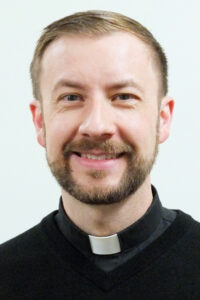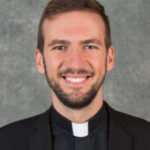By Father Thom Hennen
It has been a long while since I have written anything on vocations for the Messenger and a lot has happened since then. Between my own assignment changes, a global pandemic, a national examination of conscience on issues of race, and a contentious presidential election, it has been easy to be preoccupied, but it is good to return to these pages.

In recent months, among various advisory groups within the diocese and at the annual parish corporate board meetings, we have been sharing information and forecasting, as best we can, about the state of priestly vocations in the diocese and its impact on parish planning.
I would be lying if I said the local picture in the not-too-distant future did not look grim. Even with a steady pace of ordaining, on average, one priest each year, we know this will not keep up with retirements or extraordinary circumstances, such as sudden illness or death, which could take additional active priests “out of play.”
The long and short of it: 33 of our current 55 active diocesan priests will be age 70 (and therefore eligible to retire) by 2030. Assuming we keep all the remaining active priests and add 10 more in that time, that gives us 32 priests to serve the diocese. Of these, however, not all would be pastors. Those newly ordained would need to serve as parochial vicars for at least a couple of years to “get their sea legs,” and some would serve in other ministries, such as hospital or university chaplaincy. In 10 years’ time, it works out to about as many pastors as counties in the diocese (22). Some counties will need far more than just one resident priest and three counties already have no resident pastor.
Suggestions abound as to how we can solve this problem, from ordaining married men, to ordaining women, to recruiting more international priests, to making greater use of permanent deacons, lay parish life coordinators, parish business managers, and “senior priests,” and further consolidation of parishes where appropriate.
Some options are “on the table” and some, frankly, are not. Some are within our control at the diocesan level and some are not. Some options are more ideal, some less so. Proposals for a single or simple solution clearly do not go beyond a step or two.
So what can we be doing now to ensure not simply the minimum vital signs of the church in southeast Iowa but its vibrancy? It seems to me we always strain our brains for the “big ideas.” As I think about what inspired me to discern a vocation of service in the church, I realize there are many smaller, much more doable things that are no less vital.
First, it begins with families, who pray and practice their faith, who prioritize Sunday as a day for the Lord and for each other. In thinking back on it, so much of why I considered being a priest had more to do with the most “basic” things. Things like going to Mass as a family on Sundays, receiving the sacrament of reconciliation with some regularity, praying before every meal and sharing in discussions about faith, politics and culture around the dining room table. One of the few “happy accidents” of this pandemic has been greater opportunity for these sorts of family encounters.
Second, we must pray for vocations. I know we say this all the time, but it is true. We need to pray and pray hard. Pray that individual men and women would answer God’s call to priesthood, diaconate, religious life and to holy and committed marriages. Pray that we can collectively create a culture in which it is normal and healthy to consider these callings. Pray for a vocational climate in which the first question our young people ask is not, “What do I want to do with my life?” but “How is God calling me to use the life entrusted to me for the service of others?” Again, perhaps one of the “happy accidents” of this tumultuous year has been the desire to ask bigger, more important questions.
Third, we need a focus on evangelization, not to pad our numbers and keep our doors open, but because that is who we are. What if instead of thinking of our parishes as “sacrament stations” we saw them as mission basecamps? What if the work of the Gospel was unceasing in our parishes, through catechesis at all ages, community outreach, direct service to those in need, advocacy, prayer and worship?
Some might object that this would diminish the importance of the priest and of the sacraments, but in thinking of those places in the world that are truly “mission territory,” you will find an even greater respect for the priesthood and a hunger for the sacraments.
There are still more questions than answers and it is always hard to predict the future, but at the end of the day I know this —Jesus Christ is the same yesterday, today and forever!
(Father Thom Hennen serves as vicar general for the Diocese of Davenport, chaplain of St. Ambrose University in Davenport and associate director of vocations.)











